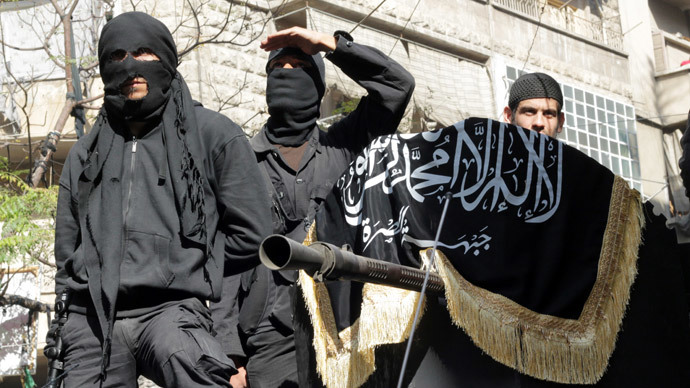Extremist tourists: 250 jihadists reportedly return to UK

Around 250 British jihadists have returned to the UK after training and fighting in Syria, a senior Whitehall security official told the Sunday Times. Security services are monitoring the “extremist tourists”, fearing they might carry out attacks at home.
Ministers have been informed that more than 400 Britons went to Syria to engage in militant activities, and “Well over half of those who traveled out have come back,” the official told the Times.
Senior security officials say the number of “returnees” is now five times the previously reported figure, highlighting the growing threat of so–called ‘extremist tourists’ going to warzones and returning home hardened militants.
"For some, their jihad is done, others will help others travel to Syria, while others will raise funds for fighting," the Whitehall source said.
The security services are said to be closely monitoring the 250 returnees, who include several veteran hardliners who have fought in Afghanistan or Pakistan. Many others have participated in combat or received training in munitions or other skills applicable to terror operations, with some exhibiting a willingness to carry out attacks in the UK, security officials cited in the report said.
“There are a few hundred people going out there. They may be injured or killed, but our biggest worry is when they return they are radicalized, they may be militarized, they may have a network of people that train them to use weapons,” London police chief Sir Bernard Hogan-Howe told the paper.

When RT contacted the British Home Office, it responded with a pre-prepared statement from Immigration and Security Minister James Brokenshire.
In the statement, Brokenshire said there “up to 200 UK nationals” fighting in Syria “who may come in to contact with extremist groups that aspire to attack Western countries.”
He did not comment on Sunday’s report, however, only saying that the British government “is determined to detect, disrupt and where possible prosecute all terrorist threats, whether international or home-grown.”
“We know there is a risk of individuals returning to the UK after being radicalized, but they should be in no doubt that the police and intelligence agencies are working to identify and disrupt potential threats and protect national security. The police have the power to examine and detain individuals at the UK border to investigate any concerns of terrorism involvement.”
It is reported that many of the militants arrive in Syria via Turkey after joining one of the several British-organized aid caravans outwardly bringing humanitarian relief to Syrian refugees. The report says that once in the country, the UK jihadists may also be given special instructions on how to carry attacks back home. The report also warns that some of the UK citizens might even be training extremists from multiple countries about conditions in Britain.
Reports of the returnees come after the details regarding the first suicide attack carried out by a British national in Syria were made available.
Abdul Waheed Majeed is believed to have driven an explosives-laden truck into a jail in Aleppo earlier this month, joining the 20 British citizens to have died fighting in the Syrian civil war.

Political commentator Mohammed Ansar told RT Majeed’s attack presented a real difficulty to security officials, as he “does not fit the profile of a young British jihadi who has gone to Syria to fight.”
“One of the most worrying aspects we’ve seen of late is that people who are out in Syria, fighters from Britain, have been calling others to come and join them, whether they are British Muslim women, to support them,” he said.
“And they are setting themselves up as being effectively warlords who are out there, who are gun touting, and are really no benefit and no blessing to the people, and are going to become increasingly radicalized, and often go out there with a martyrdom mentality and often talk of not returning to this country.”
MI5 director-general Andrew Parker told parliament last year that the Syrian conflict has become a magnet for British nationals looking to engage in jihad, many of whom come into contact with Al-Qaeda-linked groups.
MI5 and police reportedly thwarted an alleged terrorist plot by extremist tourists operating on British soil last autumn. The terror cell was allegedly playing a mass shooting and bombing similar to the 2008 Mumbai 2008 attack, which resulted in 168 deaths and over 300 wounded.
Overall, around 2,000 European citizens are currently believed to be fighting in Syria. In January, the Wall Street Journal reported that intelligence agents from several European countries, including the UK, Germany, France and Spain, first traveled to Damascus last summer to speak with Syrian officials on how to work together to tackle the European jihadist threat.
The agents reportedly sought to share information on at least 1,200 European jihadists who traveled to Syria to help topple the government.














